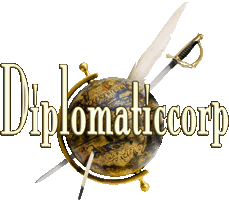First of all, allow me to thank the GM for all his work during this game and for giving us the opportunity to have fun playing it.
Second, congratulations to Russia for his overwhelming solo, proving that the player who communicates more during the game and has a solid strategy from the start to the end usually wins.
Regrettably, I didn't communicate as much as I should during this game, partly because it was my first experience in this community and I wanted to test the waters, reacting more than proposing. So, if in these EOG's my tone is a bit more critical than others, please be assured that the first I'm criticizing is myself! And why be critical? Because Dip games are not supposed to end in 22-sc solo victories in 1906! If it happened, it's not only because of Russia's obviously strong playing, but also because we, the defeated players, allowed it to happen.
The first problem was Germany's absence. It completely shifted the natural balance of Dip. It had two big consequences: First, Russia had not to worry about his potentially most dangerous contender on the board and was free to invest everything in the more secure northern and southwest fronts. Second, France strangely gained Mun in the first year (and was not evicted in the following year!), putting in question the balance of the EF understanding (4 against 6 sc's, with me having additionally to worry about the russian fleet-building in Stp-nc). It also destroyed the strategy I had chosen to put into practice from the start, which consisted on having an EG versus F on the west and an EG versus R on the east, while trying to convince the other powers to put some pressure from their side on F and R. The absence of Germany forced me to reach an understanding with F (after having a fleet on the Channel!) that never was very strong.
The second big moment of the game, from my point of view, came when the supremacy of Russia was evident and his solo eminent. The idea of an ITE alliance, first against Russia and afterwards against France, was proposed. There is, usually, a sort of reflex of players to avoid incoming solos, being able to forget their past differences and unite against the common threat. Unfortunately, this didn't happen, with Italy refusing to abandon his longtime friend. By doing this, Italy gave the game to Russia, I think. Hopes for a 17-17 draw were no longer realistic in that moment, I believe.
Even without the ITE reactive alliance, maybe a strong EF could, at the very least, postpone Russia's solo for a few years. But the EF understanding was never very strong and it became weaker when the ITE plans were passed to France by someone. (Btw, the reason for proposing an ITE instead of a IFTE was as a sort of prize for Italy, since France was preparing to attack him - even so, my proposal was for an ITE with two moments - first, the clear and present danger posed by Russia and only afterwards France.) This led to France's stab on me. Quite frankly, it was incomprehensible to me: To stab a naval power like England when having just two fleets, both positioned on the med, and in a moment where my fleets were the only obstacle to Russia's further expansion on the north - I'm sorry, but I can't se the rationale behind that move.
Again, apologies for the critical tone, but I believe EOG's are supposed to be an analysis of the game and not only nice words - and this, right or wrong, is my analysis. Having said that, thanks to all of you for the game and I hope that in the next games we all, starting by myself, will make life a bit more difficult to the Russias of this game.
Best regards,
João
Explore the seven wonders of the world Learn more!

